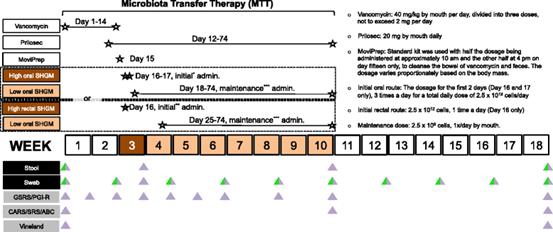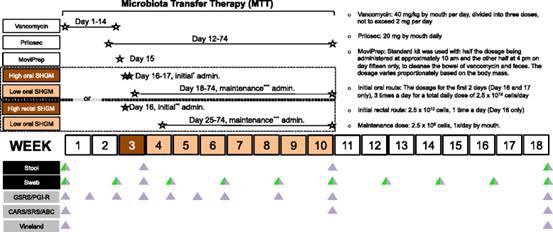自闭症谱系障碍(ASD)的病理学与肠道微生物群之间的联系已经被越来越详尽的研究证明是存在的,这些研究结果也引导人们思考是否可以通过对肠道微生物群的一些操作来缓解ASD的症状,也有许多研究已经阐明了肠道微生物对于ASD的可能的作用机制,并促使研究人员专注于研究针对肠道微生物的可能的治疗方案。

2015年至2016年期间,Frye等人发表了三篇研究,试图解释ASD和肠道微生物群之间的关系。在这之前,许多研究者就已经研究过这种关系,得出了有参考价值的数据,表明ASD个体胃肠道内细菌数量的比例可能会影响ASD症状。然而,这一现象的背后的机制尚不清楚。因此,Frye等人旨在进一步阐明细菌种群比例、线粒体和ASD症状之间的联系。
 |
Frye等人研究引起了D.W. Kang博士的兴趣,为了进一步研究微生物群对ASD症状的影响,Kang博士的团队进行了一项研究,其中将去除ASD个体的整个肠道微生物群,然后用益生菌和粪便移植产物替换,被称为微生物转移疗法(MTT),该方案结合益生菌以及定制和可复制的粪便移植产物,旨在持久的缓解ASD症状。结果 表明ASD个体的父母报告他们的孩子在治疗过程中,减轻了高达82%的腹痛和其他胃肠道症状,其中89%的研究对象对治疗反应积极;父母也报告了ASD相关行为障碍的改善。但该研究没有采用对照组或随机设计,这使得研究推论需要谨慎对待,并且作用机制等也需要进一步的研究。
表明ASD个体的父母报告他们的孩子在治疗过程中,减轻了高达82%的腹痛和其他胃肠道症状,其中89%的研究对象对治疗反应积极;父母也报告了ASD相关行为障碍的改善。但该研究没有采用对照组或随机设计,这使得研究推论需要谨慎对待,并且作用机制等也需要进一步的研究。
参考文献:
[1] Kang, D.W., James, B.A., Ann, C.G. & Thomas, B. (2017). Microbiota Transfer Therapy alters gut ecosystem and improves gastrointestinal and autism symptoms: an open-label study. Microbiome, DOI 10.1186/s40168-016-0225-7
[2] Frye RE, Rose S, Slattery J, Macfabe DF. 2015. Gastrointestinal dysfunction in autism spectrum disorder: the role of the mitochondria and the enteric microbiome. Microbial Ecology in Health & Disease. 26(1).http://www.tandfonline.com/doi/abs/10.3402/mehd.v26.27458@zmeh20.2015.26.issue-s1
[3] Frye RE, Slattery J, Macfabe DF, Allen-Vercoe E, Parker W, Rodakis J, et al. 2015. Approaches to studying and manipulating the enteric microbiome to improve autism symptoms. Microbial Ecology in Health & Disease. 26(1). http://www.tandfonline.com/doi/abs/10.3402/mehd.v26.26878@zmeh20.2015.26.issue-s1
[4] Slattery J, Macfabe DF, Frye RE. 2016. The Significance of the Enteric Microbiome on the Development of Childhood Disease: A Review of Prebiotic and Probiotic Therapies in Disorders of Childhood. Clinical Medicine Insights: Pediatrics. 10:91-107. https://www.ncbi.nlm.nih.gov/pmc/articles/PMC5063840/
(编写者:龙洁 审稿者:苏雪云)
